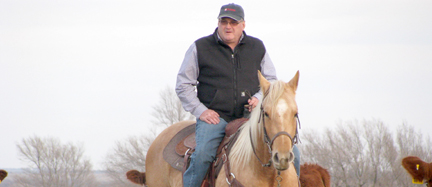It’s National Ag Week

With a mind to water conservation and regulation, local farmer Gregg Wiedel turns to the Water Leader’s Academy.
Hebron farmer Gregg Wiedel wants to be a part of Nebraska’s changing water scene by creating ideas about water conservation, helping establish new water policy and regulation and keeping up to date on how future generations will be affected by what’s happening now.
To learn what he could do to stay up to date with today’s issues, he turned to the Nebraska Water Leaders Academy and after a year of attending classes and workshops, is now ready to act on some of the ideas and knowledge presented there.
Simply put, the Nebraska Water Leaders Academy is a program that identifies community leaders and educates them about water issues. The program touches on leadership skills, preparing participants to take an active role in making decisions about water resource issues.
In 2009, the Nebraska State Irrigation Association (NSIA) identified a need to develop water resource leaders who understand the economic viability of the state’s rivers, streams and aquifers. In partnership with Diamond Plastic and the help of a grant from the Nebraska Environmental Trust, the Water Leaders Academy was created.
Acceptance into the program depends on certain criteria including a commitment on the part of the participant to understand Nebraska water issues, interest in seeking leadership roles on public boards, commissions and water policy groups and a commitment to the community through voluntary activities.
“I sent in a resume explaining my interest in why I wanted to be a part of the Academy,” Wiedel explained. “There were only 12 of us chosen to participate; I was one of two farmers.”
Wiedel said the group was diverse including a person from the Natural Resources District, a Nebraska Game & Parks worker, an attorney for water and wind, a state lobbyist. “We all had something at stake – we all were very interested in Nebraska’s water, but our interests were as varied as our professions.”
Wiedel said, as a farmer, he represented producers using groundwater irrigation while the other producer was experienced with surface water irrigation, explaining that although their professions may have been the same, the two usages were regulated differently.
“When I sent my application in,” Wiedel explained, “I also told them I was interested in learning the rules and laws about water. I’m a big advocate for keeping Nebraska water state regulated. Just as I am an advocate for keeping our NRDs locally regulated.”
Smaller government meets the needs of the local area, he explained, noting how it doesn’t make sense to have a standard set of regulation for vastly different bodies of water such as the Ogallala Aquifer compared to the lakes in Minnesota or the Florida Everglades. “We use water in various ways such as for agriculture, urban development and recreation,” he said and added that he feels keeping regulation local means creating management techniques specific to an area’s water needs.
“I want to be a part of that,” Wiedel stated. “I want to be knowledgeable enough to help out if questions arise.”
The Water Leaders Academy is a one-year program that educates these chosen individuals about water issues such as those Wiedel mentions. Domestic, agricultural, industrial and recreational water laws are touched on in the class as participants learn to become actively involved in guiding future water policy, management and development in the state.
Participants attend six sessions every two months at various locations throughout the state. Wiedel said his group attended classes from Omaha, “where we learned what it takes to run an urban water treatment facility,” to Scottsbluff where the landscape and drought mean use of widely different irrigation techniques than are used here at home.
Participants are also treated to lectures and workshops about local, state and national water laws from water experts and federal and state government agencies. “We really had to get those laws down,” Wiedel said.
He said the large group of 12 was divided into sub-sets of four to pick a project and create a presentation of any current water-related issue.
“During one of the classes we were told Nebraska has 23,000 linear miles of streams and rivers that transect and border the state,” Wiedel said. “And from those streams, rivers and our aquifer, we groundwater irrigate more than any other state in the U.S. We surpassed California and Texas in irrigating crops last year.”
Irrigation is Wiedel’s prime interest, or more to the point, conservative groundwater irrigation. “We are so efficient today that you don’t see flood irrigating as much anymore. There just isn’t as much over-application as there used to be. If we pump an inch, we use an inch – no more run-off.”
And that’s a good thing as far as he’s concerned, because it means farmers are saving water. “Less run-off means we are using all the water we pump. In fact, we have far more wells today than we did 20 years ago, but we use less water per acre to produce more bushels per acre. It shows how efficient our water use has become.”
Wiedel points to his no-till approach to planting as a means of conserving water, too. When applied to conservative irrigation, the savings are tremendous he said and added, “Tilling, or turning over the ground, allows any moisture underground to escape and evaporate. And especially in times of drought, any moisture that can be held in the ground is a plus.”
Wiedel said that during the class the group he was assigned to created a water user’s guide which addresses no-till planting and efficient irrigation as well as other issues facing today’s producers. The group will present the project to a University of Nebraska-Lincoln class on April 12.
“Sharing ideas is one of the reasons I took the class,” he said. “I want to help make a difference in water policy; create ideas for conserving water, for efficiently using water, and making sure we have plenty of water in the future. I want people to know that we are not just idly sitting by watching our water run downstream. I want people to know we are trying to do something out here in Southeast Nebraska.”
Gregg Wiedel, 55, has lived and farmed his whole life in Hebron. He is a member of the Thayer County Livestock Feeders Association and Nebraska Cattlemen where he served as vice-chairman and chairman of the Farmer/Stockman committee as well as the executive board.


